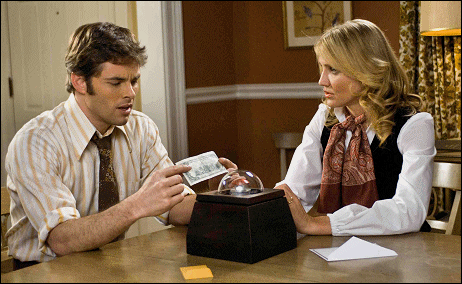Back in the ’50s or early ’60s a modest-sounding movie like Richard Kelly‘s The Box would have been shot, cut and released within nine to twelve months. Even by today’s dragged-out standards The Box, which shot in the Boston area in December 2007, would have been playing by late October 2008 (i.e., Halloween) or certainly sometime between the spring and summer of ’09. If it’s any kind of commercial draw, I mean.
I say “modest sounding” because The Box is based on a little old Twilight Zone episode called “Button, Button,” which itself was based on a Richard Matheson short story that was written in 1970. It’s not Close Encounters of the Third Kind. It’s just a suburban moral fable that says “don’t be a greedy yuppie.”
Last June, however, Warner Bros. reportedly decided on a release date of 9.11.09. Then on 9.22.08 RichardKelly.net announced that WB “has pushed the release date of The Box back up to 3.20.09.” More recently the studio changed the release date to 11.6.09, which will be nearly two years after the start of principal photography.
Obviously concerns and hesitations are afoot here. Release dates getting shuffled around like this always means something’s amiss. Kelly needed to do something straight and modest after the disaster of Southland Tales, and The Box certainly looked like that — no big deal, open-and-shut thrills, no muss or fuss. I really hope he hasn’t blown it again by getting too ambitious and over-thinking things. Sometimes a thriller needs to just be a thriller the way a cigar needs to just be a cigar.
The movie plot involves a suburban white-bread couple (James Marsden, Cameron Diaz) receiving a strange wooden box from a very creepy older guy (Frank Langella). Press the button on the box, he says, and the owner will receive $1 million, although this act will simultaneously cause the death of another human being somewhere in the world — someone they don’t know.


